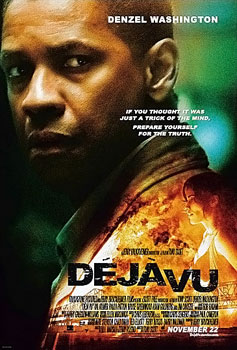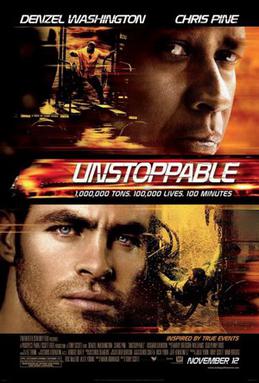Between
2004
and his untimely death in 2012, Tony Scott made five films, four
of which were collaborations with Denzel Washington. The two had
worked together before in 1995's Crimson Tide, but now began a streak of
films that combined Scott's decades of experience as a studio
blockbuster veteran with a much more kinetic and experimental visual
style.
Here are three of those films, starting with. . .
Scott's Man
on Fire, based on the novel by A. J. Quinnell was a movie the director originally wanted to make in the early 80's, shortly after completing his movie The Hunger,
but at the time Scott was deemed "too inexperienced" to adapt the
bestseller. Years later, significant changes were required to modernize
the story - at the time of the book's publication, Italy was a major
center of kidnapping and so the setting was changed, as was the
protagonist Creasy's background. Scott assembled a brilliant cast,
including a wholly restrained Christopher Walken as Creasy's best
friend, a sly Giancarlo Giannini (Casino Royale) as a former head of Interpol, and even a pre-Sin City Mickey Rourke as a sketchy lawyer.
The
resulting film takes place in Mexico City with Creasy - played by
Washington with a powerful mixture of tenderness and ferocity - as a
former US Special Forces soldier drowning his guilt in alcohol, now
turned bodyguard. His relationship with his charge Pita (in one of
Dakota Fanning's early major roles) forms the film's emotional core,
with Creasy's struggle with drink and desire for redemption for his past
creating Scott's most thematically religious film. Aside from the
references to scripture, there's the returning motif of swimming which
becomes almost baptismal once Creasy goes on the warpath. The bursts of
drinking and violence also play host to Scott's hyper-fast and visually
disorienting editing style that he first began using in Enemy of the State.
Paired with the quiet and contemplative (and often multi-layered)
approach Scott takes with the slower character scenes, the resulting
texture of the film is singular in its ability to visually and
viscerally engage the viewer.
Man on Fire is also at odds with Scott's previous Mexico-centered vengeance yarn Revenge, Where that film wholly demonized the cycle of violence brought on by the lust for retribution, Man on Fire
makes it the inferno that Creasy must descend into in order to find
salvation on the other side. The movie doesn't make pains to glamorize
the violence itself however, often cutting away from it or lingering on
the pained expressions of victims. And it makes no apologies for
Creasy's brutality, in fact making sure to underline it often using the
visuals as well as a haunting score by Harry Gregson-Williams.
Like
its protagonist, this movie is raw and jagged in places, definitely not
the most refined or nuanced of Scott's films, but it may be his most
passionate and is one of the most emotionally engaging.
Déjà Vu is something of an oddity in Tony Scott's filmography. While his brother Ridley made his first big splash (and some of his best work) in sci-fi genre film-making, Tony spent his mainstream career (after the erotic vampire thriller The Hunger) mining the more realistic side of action cinema. Until this movie.
The film centers around ATF agent Doug Carlin (Washington) working with an FBI team in the aftermath of a ferry bombing in New Orleans. In the course of their investigation, it becomes clear to Carlin that the hyper-advanced time-delayed surveillance technology being used by the FBI is actually a four and a half day window into the past - possibly more. The central conceit is a clever twist on the time travel device, with some heavy but well-established rules that the film explains with some impressively non-intrusive exposition. It's also the device that gets the "Tony Scott touch" - like previous films, Scott's hyper-kinetic sensibilities are mostly anchored to a single visual narrative device (the satellite images in Enemy of the State, the volatile state of Creasy's alcohol-addled mind in Man on Fire, etc.). And while things can get somewhat shaky during the action, Scott's careful to establish the geography of a scene before so the viewer isn't totally lost. And the way that he combines the time travel schtick with traditional action film standbys results in some very inventive sequences, like a car chase where the participants are several days apart.
Aside from the (surprisingly low-key) sci-fi elements, the most notable part of the movie is easily the way handles the terrorist plot element of the film. From the opening tragedy to the character of anti-federal domestic nut job Carroll Oerstadt, the film creates some eerie (and according to the filmmakers, intentional) parallels to the 1995 bombing of the Alfred P. Murrah Federal Building by Timothy McVeigh. The FBI even mentions Oklahoma City in connection to Carlin's history with the ATF. As an Oklahoma native, the movie hits pretty close to home, but in the post 9/11 racially-charged political climate it's especially important to remember that the second-biggest terrorist attack on American soil was the work an anti-goverment white guy.
Overall, the film isn't as strong as Man on Fire or Crimson Tide, but features the stronger emotional core that characterized Scott's later work. Washington's mounting obsession with a woman who may be the key to stopping Oerstadt could easily have become uncomfortable, but Denzel pulls off an impressive balancing act. Flawed but enjoyable.
What turned out to be Tony Scott's final film almost wasn't a Tony Scott film at all. "Based on true events" (specifically the "CSX 8888 Incident), Unstoppable was originally on track (sorry) in 2007 under Casino Royale-helmer Martin Campbell. In early 2009, Campbell stepped down and Scott came aboard with Denzel Washington and Chris Pine. The production continued to be shaky, with Washington nearly dropping out of the film for good, and numerous budgetary concerns.
Things eventually got ironed out (obviously), but the shooting remained harried and beset with production problems (like accidental derailments) that ironically mirrored the story. Two conductors (Pine and Washington) chase down an unmanned runaway train full of hazardous chemicals that would cause incredible damage if it crashed in a populated area. Rosario Dawson is their chief at the yard, contending with the logistics of stopping the "missile the size of the Chrysler building" while also contending with a fatuous boss who doesn't want to risk losing money or good face during the crisis.
There's not a lot else to the film - it's very basic and very efficient, playing the "new guy/veteran" cat-and-dog-in-a-barrel angle with Pine and Washington's characters, throwing in just enough about both men's outside lives (the film takes place during a single day) to give weight to the action. A good deal of this is established visually early in the film (visual character work being a talent of Scott's), and then sparsely sketched out just in time for it to raise the stakes at the appropriate moment.
And honestly, as enjoyable as this movie is, it often feels merely adequate and safe compared to Scott's other work. One the one hand, his camera work and editing aren't quite as wild as it is in Man on Fire or Domino, it's still full of hand-held shots and quick cuts, not to mention near-countless push-ins (seemingly for dramatic punctuation, but soon lose their effect) that lack the central conceit of the visual antics in his other "later" films. Granted, Unstoppable is still incredibly capable as a film, combining a more basic approach to narrative with the directing techniques Scott had been perfecting, but it never feels as electric or alive as his earlier work with Denzel, and far less personal.
On the plus side, the film has great pacing and textbook escalation, and while none of the actors have to stretch much, they're certainly putting their backs into it. Harry Gregson-Williams is reliably commanding as composer. And it's honestly exhilarating watching the locomotive antics full of practical stunts and effects - large-scale destruction is so much more fun when REAL stuff is getting destroyed.
Honestly, there are far worse notes to go out on. Scott had an impressive body of work, ranging through different genres, eras, and styles, and had several admirable failures as well as multiple home-runs. The cap to this retrospective will be a movie that could have been the former, but ended up as arguably the best film of Tony Scott's career.



No comments:
Post a Comment